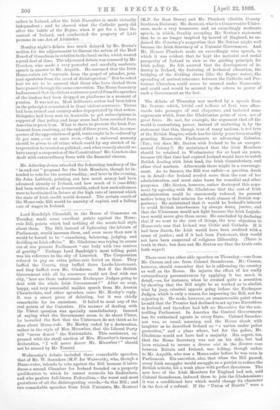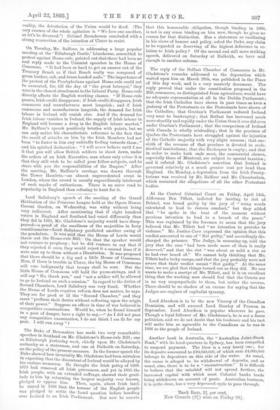There were two other able speeches on Thursday,—one from Mr.
Carson and one from Colonel Saunderson. Mr. Carson, however, should remember that he is addressing the country as well as the House. He injures the effect of his really extraordinary persuasiveness by applying it too much in detail,—as, for instance, when he created quite a sensation by showing that the Bill might be so worked as to abolish trial by jury, criminal appeals going before the Exchequer Judges, which is only a reason for improving the Bill, not for rejecting it. He made, however, an unanswerable point when he said that the Premier had declined to set up two Executives in Ireland, and therefore had left no Executive for the con- trolling Parliament. In America the Central Government has its authorised agents in every State. Colonel Saunder- son was, as usual, amusing, and the House shook with laughter as he described Ireland as "a nation under police protection," and a place where, but for the police, Mr. Gladstone would not have had a majority. His regret, too, that the Home Secretary was not on his side, but had been retained to secure a decree nisi in the divorce case between Britain and Ireland, was telling, though unfair to Mr. Asquith, who was a Home-ruler before he was even in Parliament. His assertion, also, that when the Bill passed, every Irish smuggler would smuggle as a patriot to reduce the British tribute, hit a weak place with perfect directness. The new love of the Irish Members for England had not, said Colonel Saunderson, induced them to join the Glueletonians ; it was a conditional love which would change its character in the face of a refusal. If the "Union of Hearts" were a reality, the detestation of the Union would be dead. (The very essence of the whole agitation is "We love one another, so let's be divorced.") Colonel Saunderson concluded with a strong reassertion of the intention of Ulster to resist.







































 Previous page
Previous page